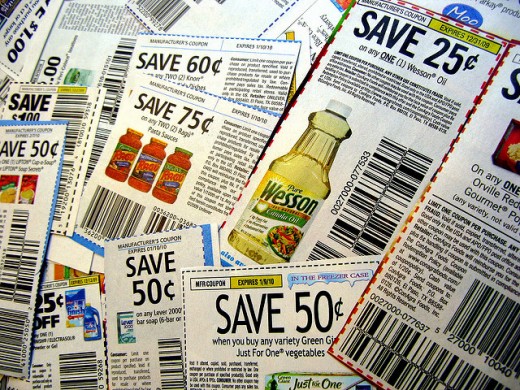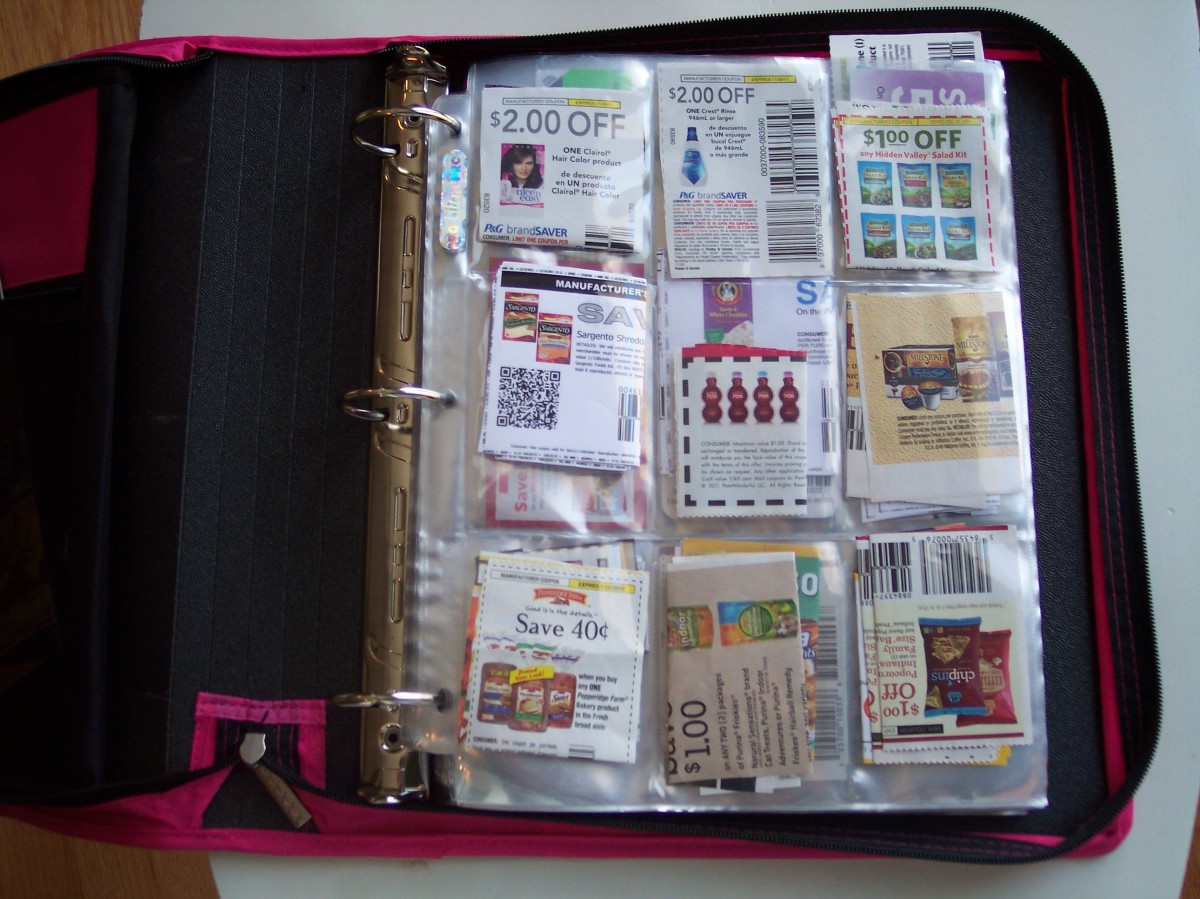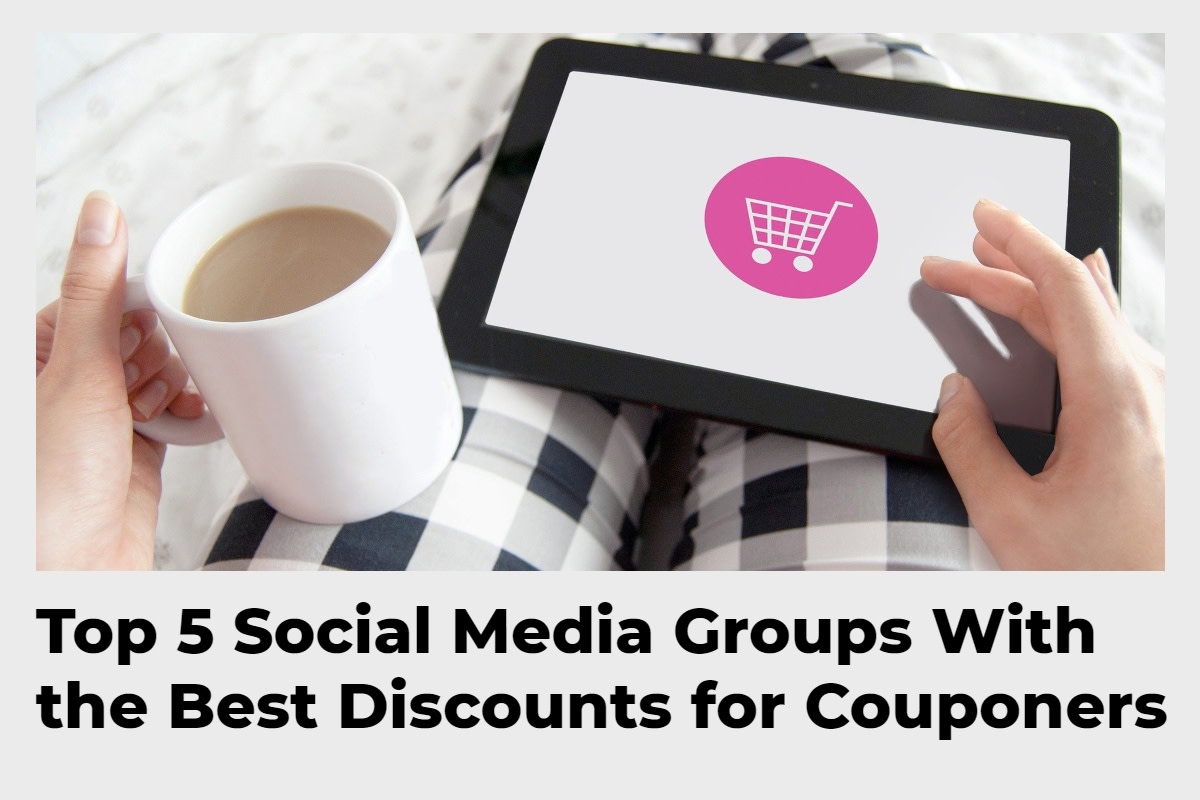Grocery Coupons: Worth the Time?
To Coupon or Not to Coupon, That is the Question!
Many people swear by coupons as a way to save money on groceries and household supplies.
I do not use them. Why? I believe it is a false perception of savings; false economy, if you will.
It is much on the same level as buying the very cheapest paper towels or toilet tissue, only to find they are so flimsy you need to use more of the product for each use.
You then actually spend more money because of needing to purchase the product more often than if you had gotten a better quality product in the first place, as it would have lasted longer.

What is Involved in Couponing?
Couponing involves a lot of work and organization that many people seem to enjoy, but for others, it is just another chore to be done, and takes time away from other activities. Let's have a look at what's involved:
Sourcing, Clipping, Organizing:
- Flipping through every page of every magazine you buy, looking for coupons you can use
- Flipping through the newspaper(s), at least the food sections, looking for coupons
- Cutting out the coupons, and hoping none are printed on the back sides of others you want, or a story you want to save
- Sorting all the coupons by category, and filing them in some sort of organizer so you can find them while shopping
- Maintaining a system for tracking any expiration dates on all those coupons, so they get used instead of having wasted your time (and going to waste)
- Finding a place to store the coupon organizer where it is out of the way, yet not forgotten when you go shopping
- Storage for all those magazines and newspapers until you have the time to sit and go through them searching for all those coupons
Do you use coupons?
The list above looks only at the time and storage issues involved. There are also, if you are being completely honest about the matter, the expenses of couponing. Some are one-time expenses, such as that organizer you want to carry, and possibly a bin for the papers and magazines. However, there are other expenses that many people don't even consider, and these are recurring:
Hidden Expenses:
- The cost of the subscriptions (or one-off purchases) for those magazines and newspapers
- Your time (no, I'm not being facetious; your time has value to you, does it not?)
- The possible cost of paying someone to cut out coupons (it may be one of your kids, or some people subscribe to a clipping service) to save your own time
- The cost of additional gas for your car, if you shop several stores for their coupons; this includes possible extra gas for getting stuck in traffic you would not otherwise encounter
- The wear and tear on your car for shopping all those stores--it's a legitimate concern; after all, that's why there are tax deductions for business mileage
- "Free" coupons online--no magazines or newspaper purchases--but wait! You have to print them out, and your paper and printer ink/toner is not free..in fact, ink and toner are quite expensive
Some folks might be into the latest technology, in which a coupon can be downloaded, stored in their 'smart phone,' and shown at the register that way. It's a fairly new application, and not everyone has access to this option. Besides, if you're doing that, it's still not free: you also have to figure in a portion of the cost of your phone service...data/text charges and what have you that are incurred.
To honestly claim significant savings, you really must factor in all of these hidden costs to what it takes to deal with coupons, and deduct those costs from your perceived savings. You may not like what you discover.
Comparing Brands
When you come right down to it, coupons truly serve only a single purpose, and it is not to provide significant savings to the consumer. No, it's to ensure brand-name loyalty. That is all. They are but an advertising ploy; a gimmick.
How can I be so sure of this? Just think for a moment. When was the last time you saw a cents-off coupon for any store-brand/private label product? Think about that for a moment; I'll wait.
****************************
Okay, I'm guessing you have your answer by now, and it probably matches mine: "Never." That's right. There are no coupons created for saving money on private label store brands because they are already much less expensive than the name brand counterparts.
And truthfully, there is really no difference in quality between name brand and house brand items in the majority of cases. None that could be detected in a blind taste test, anyway. It is all about habits learned from years of being persuaded (brainwashed might be a better term) by heavy-hitting advertising campaigns.
You Have Paid For Those Coupons!
Make no mistake: everyone buying those brands is paying for that advertising, which does not come cheaply. That is the only honest reason name brands cost more. So, in a sense, you are paying the companies to give you the coupons to give you the illusion of saving money, when in point of fact, you have already paid them back plus, for their product and advertising costs!
What is even more ironic, is that many private label brands are made by the very same name-brand companies, just run down a separate packaging line to get the different labels. On an ingredient-for-ingredient, comparison, they are usually identical, or so close as to be not worth mentioning.
Sometimes, there are small differences, and every so often, those differences are better. For example, a famous national brand of soup has a "low sodium heart-healthy" version of several of its flavors. I compared it to the regular version, same flavor, of the house brand, and guess what? The house brand was even lower in sodium than the name-brand's supposedly 'heart healthy' version! That is important to me, as my husband is a heart patient.
So, there is no real reason to favor the famous brands over a house brand. And in my experience, the latter is still less expensive, even after figuring in any 'cents-off' coupon on the name brand.
Some Concrete Examples
On my desk is an assortment of coupons. One is for a skillet meal using hamburger. ( I substitute a soy vegetarian analog, but that is not the issue.)
The name brand package of this 'quick meal mix' is $1.78 per box, at the discount grocery chain where I shop. The coupon is for 75¢ off. So far, it sounds like a decent savings. You'd pay only $1.03, But, hold the phone! Read further and the reduction applies only to a purchase of three boxes of the stuff! Let's do the math:
$1.78 times 3 boxes = $5.34. So: $5.34 - 75¢ = $4.59, rendering the cost of each box at $1.53, or half a dollar more than if the coupon applied to only a single box.
Now, let's look at the cost of the house brand of the same type of item: 98¢, or a savings of over half a dollar, (at 55¢) less than the price of the name brand with the coupon "savings" applied. Even if the coupon was good on just one box, that $1.03 is still a nickel more than the house brand. When you are on a fixed income, nickels and pennies do count!
Another example is macaroni and cheese boxed products. This is one of the earliest 'convenience foods' to have hit the market, way back in the days of the dinosaurs, when I was a child.
The assorted name brands of mac-and-cheese cost more than double the house brand, which, at the same store used for the above comparison, sells for just 68¢ a box! This even beats the dollar store price by 32¢!
(You really have to be an educated, price-aware shopper to get deals at dollar stores! Much of what they sell is available for less at the regular grocery store; mustard and table salt are two such examples!)
Another Game They Play
Another stunt these corporations love to play, is to make the coupon good only on certain sizes; usually a mega-size that is too much product if there are only 2 people in the household, or, even for a larger family, too large for available storage in the home. If you buy more than you need, you are wasting money.
I am reminded of an uncle (by marriage) of mine who loved to practice this sort of false economy. At Thanksgiving, he would go out an buy the largest turkey he could find, on the grounds that it was a few cents cheaper by the pound.
So far, so good. The problem arose after T-Day. The family consisted only of himself and my aunt. That was way too much turkey for just 2 people to reasonably use in the first place.
Here is where it got truly ridiculous: he did not like, and refused to eat, leftover turkey in any way, shape or form! What to do with all those leftovers??? Can you imagine the difficulty of trying to give away leftover turkey right after Thanksgiving???
That sort of practice is called being 'penny wise and pound foolish.' Or to use a more modern, and less polite expression, 'saving pennies and sh**ing dollars.'
Environmental Concerns
All of those newspapers and magazines take a toll on the environment, starting with the production of the paper, whether that is cutting down trees or fuel used in recycling; it all has an environmental cost.
While recycled is better, slick magazines use virgin paper, and that means trees. Newspapers are often (or can be) recycled paper, and while that is easier on the forests, it is still a process that uses a lot of power and water to produce the final product.
Paperless coupons? Perhaps..but there is a huge environmental cost in the making of those sophisticated electronics of which everyone is so enamored these days, what with all manner of solvents and heavy metals used in the process.
Mega-Couponing?
We hear so often about people saving so much money by being "ultra-extreme couponers," and doing it by doubling the coupons, adding them onto other offers, etc., supposedly ending up with claims of having gotten $600.00 worth of groceries for just $7.89, or some such equally unbelievable figure.
I cry foul and BS! It's not an easy game to play--all the organizing work above is going to be at least doubled, and that's not to mention, it's not nearly as possible as it once was.
If you read the fine print, much of that has been "outlawed," (for lack of a better word) by either the stores, or the issuing company. Notations printed on the coupons themselves to the effect of "may not be combined with other offers," or "not subject to doubling," are putting the brakes on those practices. After all--allowing consumers to do all those things costs them money, and if you are paying any attention at all these days, spending money is one thing large corporations do not want to do!
The store doesn't want to be out the cost of coupons they allowed for doubling, as they won't be reimbursed for that. The issuing company doesn't want to give you two deals in one, so they don't want to let you use a coupon on something that's already on a 50% off promotion because they figure they've already been generous enough.
Coupons, Anyone?
Not for me, thank you. I have quite enough to keep track of already in my life, and I don't believe they save me a dime over buying house brands, or paying attention to special mark-downs in the few cases where a name brand is temporarily less expensive than the house brand.
For the most part, so-called 'sale' prices at higher-end grocery stores are still higher than those at my discount chain, so I don't shop at those stores.
I don't believe coupons save me anything, so I don't play that game.
Thank you for reading.
© 2014 Liz Elias






